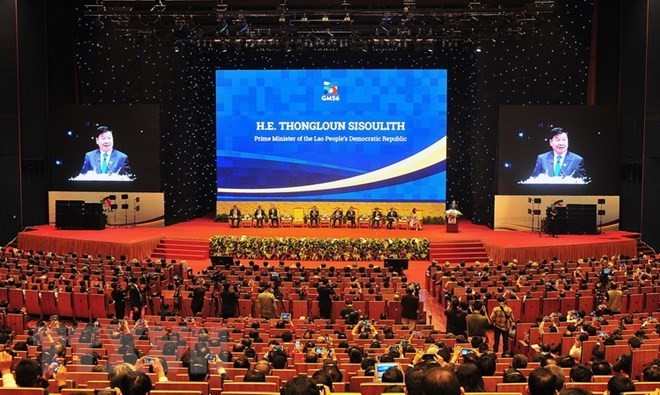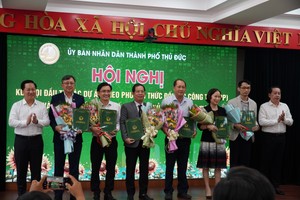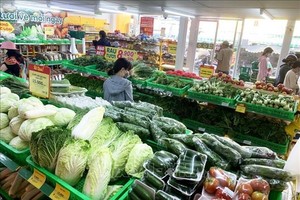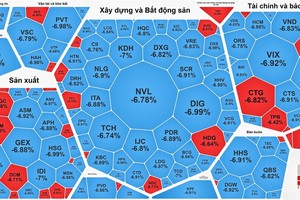
In his speech, Cambodian Prime Minister Hun Sen said, as GMS countries are likely to face the emergence of protectionism and the drop in foreign investment, they should strengthen efforts in regional integration and economic connectivity through prioritised areas of finance, economy, e-commerce and cross-border trade.
Chinese State Councilor and Foreign Minister Wang Yi stressed that the GMS Business Summit is important as this is a chance for GMS countries to listen to the voice of enterprises and call for the firms’ stronger involvement.
He revealed that China is widely opening its door for regional countries, showing China’s determination to promote trade liberalisation, open service market and attract more foreign investment.
China has so far invested 40 billion USD in GMS countries through soft loans and funding for 20 infrastructure projects, he noted.
Meanwhile, Lao Prime Minister Thongloun Sisoulith affirmed that the Lao Government will coordinate more closely with GMS states to promote business activities.
He called on businesses to increase investment in regional projects, thus helping enhance competitiveness in the GMS, while strengthening affiliation in science, and technology.
Myanmar Vice President U Henry Van Thio held that low labour costs and natural resources are no longer advantages of GMS countries, underlining that the states should create a new impetus for sustainable growth, in which the development of the private sector is vital.
Sharing the Myanmar leader’ idea, Thai Prime Minister Prayut Chan-ocha said he believes that creativity and digital technology will emerge as a new momentum for economic development on the foundation of public-private partnership.
He highlighted the need to exploit digital economic potential, encourage businesses to apply scientific and technological advances and support them in accessing capital and markets. GMS countries should also foster market links to enhance competitiveness, he said.
President of the Asian Development Bank Takehiko Nakao praised GMS countries’ progress in economic development, poverty reduction, community development and competitiveness improvement.
He held that cooperation among GMS countries will help businesses optimise advantages from technological advances as well as access markets, enhance investment efficiency and share ideas.
The ADB leader pledged that the bank will continue supporting the GMS in enhancing the involvement of the private sector in regional economic development.
ASEAN Secretary-General Lim Jock Hoi said that the ASEAN is experiencing a dynamic developing period. The bloc is predicted to become the world’s fourth largest economy in 2050, which goes along with improved incomes and living conditions of people in the regional nations. This is also a great opportunity for investors, he stated.
At the summit, Joaquim Levy, World Bank Managing Director and Group Chief Financial Officer, forecast that the global economic growth will reach 3.1 percent in 2018, and that of GMS will be 6 percent in following years.
Although the poverty rate will continue to fall, there are still risks of instability that force GMS countries to be careful in macro-economic policy, Levy stressed.
Changes in technology and population as well as climate change will greatly affect GMS countries where two-thirds of the population are poor, he noted.
The GMS Business Summit drew representatives from nearly 100 international organisations and development partners, together with more than 2,000 domestic businesses and those outside the GMS region.
GMS was established in 1992 as an initiative of the Asian Development Bank (ADB). The GMS Programme is the most complete cooperation programme that involves Vietnam, Laos, Cambodia, Thailand, Myanmar, and China’s Yunnan and Guangxi provinces.
The sixth GMS Summit, themed “Leveraging 25 years of cooperation, Building an integrated, sustainable and prosperous GMS aims to celebrate the 25th founding anniversary of the GMS Programme and define cooperation orientations to build a region of prosperity, integration and sustainable development.
Chinese State Councilor and Foreign Minister Wang Yi stressed that the GMS Business Summit is important as this is a chance for GMS countries to listen to the voice of enterprises and call for the firms’ stronger involvement.
He revealed that China is widely opening its door for regional countries, showing China’s determination to promote trade liberalisation, open service market and attract more foreign investment.
China has so far invested 40 billion USD in GMS countries through soft loans and funding for 20 infrastructure projects, he noted.
Meanwhile, Lao Prime Minister Thongloun Sisoulith affirmed that the Lao Government will coordinate more closely with GMS states to promote business activities.
He called on businesses to increase investment in regional projects, thus helping enhance competitiveness in the GMS, while strengthening affiliation in science, and technology.
Myanmar Vice President U Henry Van Thio held that low labour costs and natural resources are no longer advantages of GMS countries, underlining that the states should create a new impetus for sustainable growth, in which the development of the private sector is vital.
Sharing the Myanmar leader’ idea, Thai Prime Minister Prayut Chan-ocha said he believes that creativity and digital technology will emerge as a new momentum for economic development on the foundation of public-private partnership.
He highlighted the need to exploit digital economic potential, encourage businesses to apply scientific and technological advances and support them in accessing capital and markets. GMS countries should also foster market links to enhance competitiveness, he said.
President of the Asian Development Bank Takehiko Nakao praised GMS countries’ progress in economic development, poverty reduction, community development and competitiveness improvement.
He held that cooperation among GMS countries will help businesses optimise advantages from technological advances as well as access markets, enhance investment efficiency and share ideas.
The ADB leader pledged that the bank will continue supporting the GMS in enhancing the involvement of the private sector in regional economic development.
ASEAN Secretary-General Lim Jock Hoi said that the ASEAN is experiencing a dynamic developing period. The bloc is predicted to become the world’s fourth largest economy in 2050, which goes along with improved incomes and living conditions of people in the regional nations. This is also a great opportunity for investors, he stated.
At the summit, Joaquim Levy, World Bank Managing Director and Group Chief Financial Officer, forecast that the global economic growth will reach 3.1 percent in 2018, and that of GMS will be 6 percent in following years.
Although the poverty rate will continue to fall, there are still risks of instability that force GMS countries to be careful in macro-economic policy, Levy stressed.
Changes in technology and population as well as climate change will greatly affect GMS countries where two-thirds of the population are poor, he noted.
The GMS Business Summit drew representatives from nearly 100 international organisations and development partners, together with more than 2,000 domestic businesses and those outside the GMS region.
GMS was established in 1992 as an initiative of the Asian Development Bank (ADB). The GMS Programme is the most complete cooperation programme that involves Vietnam, Laos, Cambodia, Thailand, Myanmar, and China’s Yunnan and Guangxi provinces.
The sixth GMS Summit, themed “Leveraging 25 years of cooperation, Building an integrated, sustainable and prosperous GMS aims to celebrate the 25th founding anniversary of the GMS Programme and define cooperation orientations to build a region of prosperity, integration and sustainable development.
























